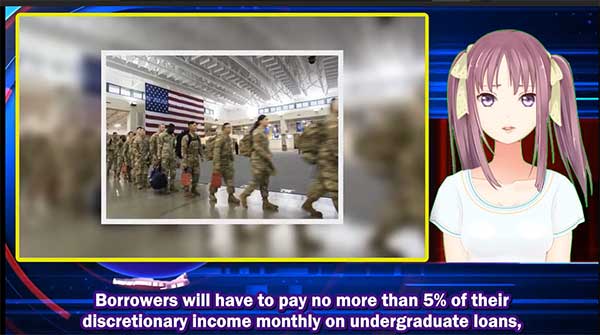 "Student loan forgiveness undermines one of our military's greatest recruitment tools at a time of dangerously low enlistments," Banks wrote in a tweet as Republicans continue to attack the White House for the announcement that it would be canceling $10,000 in student loan debt for millions of Americans.
"Student loan forgiveness undermines one of our military's greatest recruitment tools at a time of dangerously low enlistments," Banks wrote in a tweet as Republicans continue to attack the White House for the announcement that it would be canceling $10,000 in student loan debt for millions of Americans.
Though the White House is limiting forgiveness to those making under $125,000 per year, conservatives have attempted to paint the plan as a handout to the rich. Banks's comment appears to undercut that message, implying that lower-income Americans might no longer see joining the military as a path to a college education that wealthier families can typically afford without volunteering for service.
A 2020 youth poll conducted by the Pentagon found that 52% of respondents said they would consider joining the military to pay for their future education, a reason that was second only to pay. Military service also counts toward the Public Student Loan Forgiveness plan. The American military has been all-volunteer since the end of the draft in 1973, meaning the military relies on recruitment, which can focus on marginalized communities and the children of veterans.
A 2015 Education Week report found that recruiters were 10 times more likely to visit a high school in Connecticut where nearly half the students were on free or reduced lunches than they were to visit a similar-size high school in the area where only 5% of students qualified for the assistance.
As part of the No Child Left Behind Act signed by President George W. Bush in 2002, schools are required to give military recruiters student information or risk losing federal funding, as well as provide "military recruiters the same access to secondary school students as is provided generally to postsecondary educational institutions or to prospective employers of those students."
Banks is correct about struggles with signups, as every branch of the military was struggling to meet its recruiting goals as of June. According to information from Department of Defense slides obtained by Politico earlier this year, "the sharp drop in entry-level troops can be traced to young people's concerns about the physical and psychological risks of service, as well as other career interests, the possibility of interference with college education, and dislike of military lifestyle."
According to that 2020 Pentagon poll, only 11% said they would definitely or probably be serving in the military over the next few years. A booming job market could also be hurting enlistment, as 72% of the respondents said it would be somewhat or not at all difficult to get a job in their community, up from 41% in 2010.
On Wednesday, Biden announced his plan to cancel $10,000 of student loan debt for individuals making up to $125,000 or households making $250,000; the plan also cancels an additional $10,000 for Pell Grant recipients. Borrowers will have to pay no more than 5% of their discretionary income monthly on undergraduate loans, down from 10%, and will have their unpaid monthly interest covered as long as they are making payments. The plan will also forgive loan balances after 10 years of payment — down from 20 years — for those with balances of $12,000 or less.
"I will never apologize for helping ... working Americans and middle class, especially not to the same folks who voted for a $2 trillion tax cut that mainly benefited the wealthiest Americans and the biggest corporations, that slowed the economy, didn't do a hell of a lot for economic growth, and wasn't paid for and racked up this enormous deficit," Biden said during remarks at the White House on Wednesday afternoon.
Please consider becoming a $10 per month supporter of The National Network Opposing the Militarization of Youth
And our work to demilitarize our schools and youth.
Donate Here
###







